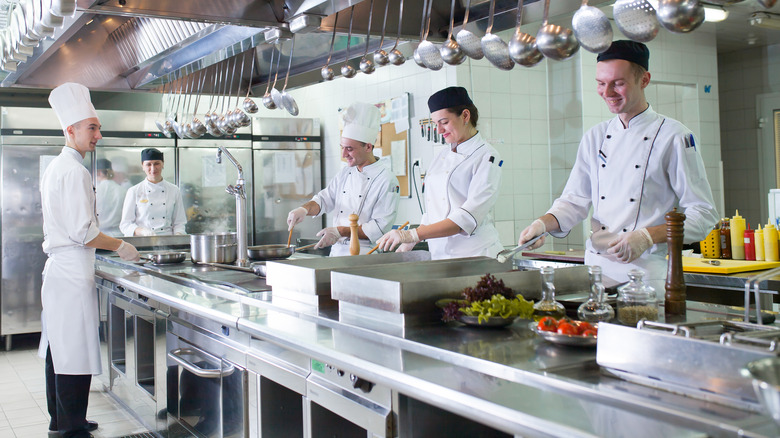How Michael Symon Gets His Kitchen Staff To Respect Him
Militaristic metaphors are at the heart of kitchen work. The term "kitchen brigade" has long structured the hierarchy of the highest kitchens. And, of course, Gordon Ramsay bellows insults like a drill sergeant. But being shouty does not appeal to everyone. On Twitter, user Jesse Hickman asked Michael Symon "How do you, as a leader in the kitchen, get people to listen without being a total d*******?"
"Work hard," Symon wrote. "Treat the people the way you [want] to be treated .. don't ask them to do things you wouldn't do .. respect is earned not given,"
That advice neatly dovetails with a similar thought Aarón Sánchez gave on Instagram. Namely, if you own a restaurant business or run a kitchen, you should be aware of the work that each person does. That way, you have the knowledge to guide your employees through tougher patches and find ways that they can develop themselves.
There's been a shift in kitchen atmosphere
These pieces of advice seem at odds with the image of kitchens that many have grown used to seeing portrayed by the media. In actuality, these snippets are part of a larger industry-wide acknowledgement that has been brewing over the better part of the last decade: bullying is a rampant problem in kitchen work.
Back in 2014, Bon Appétit highlighted how Caroline Fidanza, the chef that formed Brooklyn's Diner, pushed for a better atmosphere in her kitchen. "Caroline set a certain culture in motion. She can be very gentle," one person explained, "but she's really tough—it wasn't like this hippy-dippy, do-whatever-you-feel kind of thing. It was 'Do what you think is right, and don't screw it up.'" Similarly, Ryan Simpson, head chef at Orwell's in Henley-on-Thames, told Restaurant and Cafe that their kitchen works hard to refrain from swearing at all, as that can push real talent away.
On yet another similar note, Fine Dining Lovers compiled a series of comments in 2016 from readers (who appear to be mostly kitchen workers) responding to whether shouty chefs are a benefit or a detriment to the kitchen. They broadly agreed that a calmer kitchen tends to be more productive. In other words, a chef who resorts to shouting has only displayed a lack of ability to lead calmly. As Symon wisely put it, "respect is earned not given."

